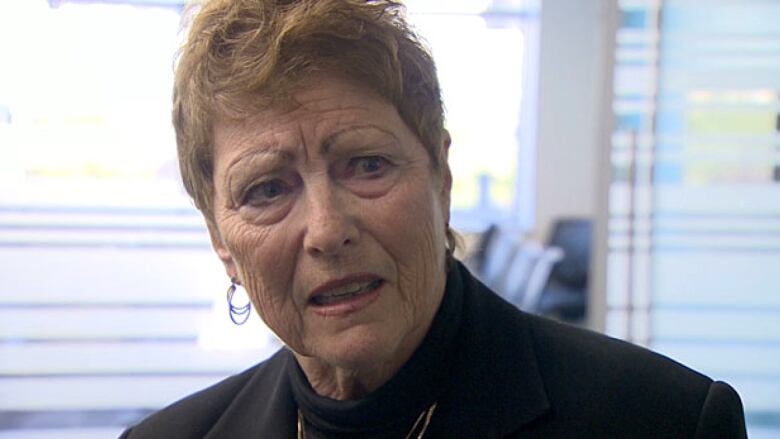Anger over councillor's latte comment reveals affordability angst of the suburbs
Delta councillor's suggestion to scrimp and save drew viral anger as affordability continues to decline

Delta Coun. Lois Jackson is hoping to move onafter her comments on how people need to"save and scrimp" and "do without a lot of things, including your lattes," in order to own property went viral.
Jackson who has served as a mayor and councillor in Delta for decades drew widespread anger for her comments during a public hearing last week, whencouncil rejected a 40-unit townhouse development to replace seven single-family homes.
"If we were talking government policy [like] George Massey replacement, being prepared for the coronavirus, condition of roads and highways, yep I'm there!" she wrote in a text message to CBC.
"But the comment that I made about young people saving to get a house? I really don't need the continued negative hateful mail I am receiving."
The reaction to Jackson's comments has underscored tensions over housing density in suburban cities, and wider issues of affordability for younger people.
Delta councillor Lois Jackson had some thoughts last week on what young people should do to get into the housing market:
"You're going to have to save, and scrimp, and you're going to have to do without a lot of things, including your lattes and all those other kinds of things." pic.twitter.com/lqjJKah5WF
—@j_mcelroyOne of the three councillors who voted for the townhouse proposal near the LadnerTrunk Road transit exchangesaid Jackson's comments missed the mark.
"This is much more than a couple of kids who are spending too much money on lattes," Coun. Dylan Kruger said.
"This is a systemic issue that comes with unsustainable zoning that's... going to result in serious implications for the economic viability of our communities, unless wemake some drastic changes."
Dont know what Id do without my morning latte. pic.twitter.com/80Y41mwozJ
—@dylankrugerbcSuburban battles
Jackson's comments became the top item on Vancouver's Reddit page and weresharedacross North America, with most criticizing the councillor.
UBC political scientist Carey Dobersteinsaid while Jackson isn't the first to suggest people start saving and skipping lattes, such advice isn't really applicable to most people in Metro Vancouver.
"The gulf between average incomes of [younger] generations and their stable incomesand professional opportunities,and that of the housing market price?The gulf is just too high," he said.
Doberstein said the debate over densityin Delta a community of just over 100,000 people, where the benchmark price for a property in the Ladner neighbourhood went up by 40 per cent in the past five years is not unexpected.
"We find this quite consistently across the country, particularly in smaller to medium-sized cities, where they're shifting from lower-density environments to slightly more dense," he said.
"This is precisely the kind of debate that all cities go through, and their political representatives struggle with neighbourhood change."
Suburban angst
There was a time when comments like Jackson's wouldn't have garnered much reaction but the surge in home pricesand the spread ofpro-density social media campaigns have changed that.
"There is a groupof younger renters who feel like they've been really stiffed by this older group of kind of incumbent homeowners, and they're sort of using the power of the internet to try to amplify these meetings that nobody's ever really paid much attention to," saidConor Dougherty, an economics reporter at the New York Times.
Dougherty recently published the book Fighting for Housing in America,which examines housing conflictsprimarily in the San Francisco area.
He said one thing he regularly came across in his research was the greater angstin places like Delta, where changes in housing options historically happened at a much slower pace than urban centres.
"It is definitely more intense in the suburbs," he said.
"A small number of people really can have a pretty large impact on the local government there ...and it's hard for local officials not to react to that with some degree of fear, because they're not used to seeing that many people be up in arms about really anything."
Is the passion helpful?
While the social media reaction is perhaps predictable these days, it'sless certain how productive theoutrage is, or whether it will change policy.
"The vitriol has gotten a little too much," saidDougherty.
"But if people realizing that their local governments are really the primary decision-makers on [housing] policy,I think people waking up to that, and recognizing that in a way that's respectful and making them feel like they're participating in a democracy, is great."
In the meantime, Delta Mayor George Harvie is chairing a housing task force.
However, he was on the losing side of the townhouse vote andanother recent vote on whether to approve a new towerfor the city. In both cases, councillors who were elected with him under the same party banner voted against him.
It highlightsanother wrinkle in municipal politics that makesit unclear how Delta's density debate will evolve.
"Local government is unique, because even when people run together on a slate it's not like running on the provincial or federal party system where you might be whipped to vote a certain way," said Sylvia Bishop, a two-term Delta councillor who lost to Harvie in 2018's mayoral election.
"It can be very unpredictable. And right now, with the mayor's slate that he ran with, it's very unpredictable."












_(720p).jpg)


 OFFICIAL HD MUSIC VIDEO.jpg)
.jpg)



























































































